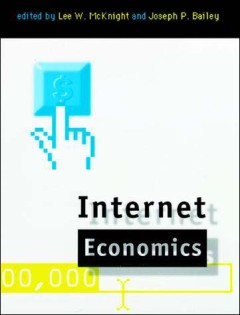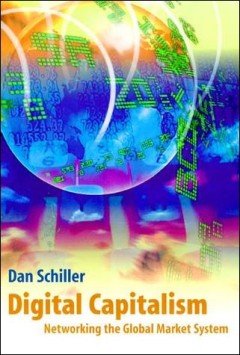Filter by

From Gutenberg to the Global Information Infrastructure: Access to Informatio…
"Will the emerging global information infrastructure (GII) create a revolution in communications equivalent to that wrought by Gutenberg, or will the result be simply the evolutionary adaptation of existing behavior and institutions to new media? Will the GII improve access to information for all? Will it replace libraries and publishers? How can computers and information systems be made easier…
- Edition
- -
- ISBN/ISSN
- 9780262255776
- Collation
- 1 online resource (xviii, 324 pages).
- Series Title
- -
- Call Number
- -

Internet Economics
The Internet has rapidly become an important element of the economic system. The lack of accepted metrics for economic analysis of Internet transactions is therefore increasingly problematic. This book, one of the first to bring together research on Internet engineering and economics, attempts to establish such metrics. The chapters, which developed out of a 1995 workshop held at MIT, include a…
- Edition
- -
- ISBN/ISSN
- 9780262279574
- Collation
- 1 online resource (529 pages)
- Series Title
- -
- Call Number
- 001 INT

Digital capitalism: networking the global market system
Schiller traces the transformation of the Internet from government, military, and educational tool to agent of "digital capitalism" through three critically important and interlinked realms.The networks that comprise cyberspace were originally created at the behest of government agencies, military contractors, and allied educational institutions. Over the past generation or so, however, a growi…
- Edition
- -
- ISBN/ISSN
- 9780262283137
- Collation
- 1 online resource (xvii, 294 pages)
- Series Title
- -
- Call Number
- -

E-topia :"urban life, Jim--but not as we know it"
"The global digital network is not just a delivery system for email, Web pages, and digital television. It is a whole new form of urban infrastructure - one that will change the forms of our cities as dramatically as railroads, highways, electric power supply, and telephone networks did in the past. In this book, William J. Mitchell examines this new infrastructure and its implications for our …
- Edition
- -
- ISBN/ISSN
- 0585108978
- Collation
- 1 online resource (184 pages)
- Series Title
- -
- Call Number
- -

Me++ :the cyborg self and the networked city
"With Me++ the author of City of Bits and e-topia completes an informal trilogy examining the ramifications of information technology in everyday life. William Mitchell describes the transformation of wireless technology in the hundred years since Marconi: the scaling up of networks and the scaling down of the apparatus for transmission and reception. He examines the effects of wireless linkage…
- Edition
- -
- ISBN/ISSN
- 9780262280020
- Collation
- 1 online resource (259 pages)
- Series Title
- -
- Call Number
- -
 Computer Science, Information & General Works
Computer Science, Information & General Works  Philosophy & Psychology
Philosophy & Psychology  Religion
Religion  Social Sciences
Social Sciences  Language
Language  Pure Science
Pure Science  Applied Sciences
Applied Sciences  Art & Recreation
Art & Recreation  Literature
Literature  History & Geography
History & Geography